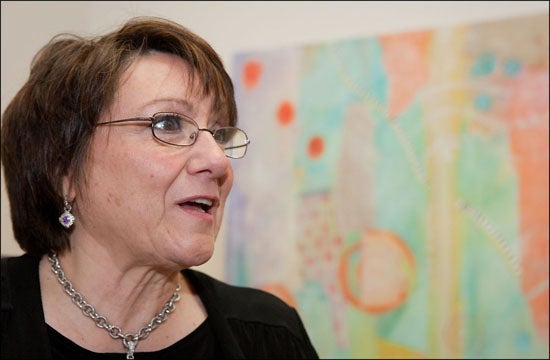JOINING FORCES
ECU College of Nursing supports national campaign
East Carolina University’s College of Nursing has joined a national campaign in support of active and returning military members, veterans and their families.
Through Joining Forces, an initiative led by the White House and First Lady Michelle Obama, ECU nursing will raise awareness and educate students about the health and social needs of service members and their families. Many are returning home with post traumatic stress disorder and traumatic brain injury.
“A major thrust of this campaign is to infuse knowledge into the curriculum at the graduate and undergraduate level in areas of research, practice, service and teaching,” said Dr. Patricia Fazzone, professor of nursing and coordinator for the college’s Joining Forces team, which held its first meeting April 12.
The American Association of Colleges of Nursing issued a nationwide call to join. ECU is one of more than 500 across the nation and 21 nursing schools in North Carolina to pledge support.
“I am pleased that our faculty and staff are enthusiastic about the ‘Joining Forces’ campaign. Our participation is in keeping with our commitment to improve the quality of health care to citizens in our region,” said Dr. Sylvia T. Brown, dean of the College of Nursing.
Ongoing commitment
North Carolina is the home of six military bases and a Coast Guard installation. ECU’s federally-funded Operation Re-entry program is developing model ways to help injured veterans while building on ECU research already under way like using biofeedback to help troops with PTSD symptoms, and counseling families of returning soldiers.
“At ECU, we have such a commitment to the military and their families that this was a natural fit for us,” Fazzone said. “There are so many troops, and their families, being affected by the war. We need to be able to respond.”
There are a number of active and retired military faculty and students in the College of Nursing, including high ranking officers. Some have been deployed or will be deployed. “We have a cadre of experts,” Fazzone said. “We are looking at partnering with other professions to be more effective in our interventions.”
The college’s action plan will be progressive and happen in stages through multiple years, Fazzone said.
Faculty members are beginning to explore possible service learning opportunities that could include expanding clinical placement of nursing students in VA hospitals, or working at schools on military bases. There are also possibilities for interdisciplinary research.
Focused on outreach
“Outreach will be a huge piece,” Fazzone said. “I think nurses are in a good position to bring people together to meet the needs of soldiers coming back. It’s a very complex phenomenon of people coming home from being deployed with many different needs.”
The college also wants to increase its participation in veteran observances throughout the year. Another area of interest is working with military nurses, engaging students from the military and encouraging them to become nursing faculty.
The college previously received grant funding to work with military installations at Camp Lejeune, Seymour Johnson and Cherry Point to encourage men with military training and experience in health care to consider nursing as a viable career after military service.
